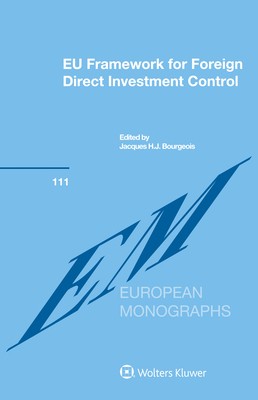
- Išsiųsime per 10–14 d.d.
- Leidėjas: Kluwer Law International
- Metai: 2019
- Puslapiai: 256
- ISBN-10: 9403518839
- ISBN-13: 9789403518831
- Formatas: 15.6 x 23.4 x 1.6 cm, kieti viršeliai
- Kalba: Anglų
- Extra -15 % nuolaida šiai knygai su kodu: ENG15
EU Framework for Foreign Direct Investment Control + nemokamas atvežimas! | knygos.lt
Atsiliepimai
Aprašymas
Foreign direct investment (FDI) has grown considerably worldwide in recent decades, alongside the no-less considerable development of international 'supply chains'. In the European Union (EU), stock held by foreign investors exceeds EUR 6 billion, while stock held in the rest of the world by EU investors exceeds EUR 7 billion. This important book analyses the current and proposed regimes of FDI screening in the EU, highlighting mechanisms designed to enhance FDI's advantages and minimize its drawbacks.
Leading practitioners, policymakers and academics discuss the 2017 European Commission proposal on FDI screening and its resulting Regulation, focusing on such issues and topics as the following:
- the economics of FDI screening;
- rising protectionism versus further investment liberalization;
- how the EU framework connects with WTO rules;
- the dangers of foreign investment in sectors essential to public order and security;
- how the EU regulatory layer interacts with FDI screening at Member State level; and
- perceived lacunae in the way the EU addresses incoming FDI.
Two detailed examples of how FDI screening works in practice are included, along with a comparative view of FDI screening in the United States. Contributions commenting specifically on the EU Regulation deal with the process of adopting the Regulation and the impact of opposing views, and how the Regulation aligns with EU policy in the areas of trade, investment and competition.
Companies engaged in FDI or financial services will appreciate the detailed analysis of issues raised by this new EU policy instrument. Practitioners active in competition law, particularly M&A, will welcome this clear commentary and analysis of a crucial component of EU policy in the related areas of trade and investment, and policymakers will be encouraged to consider whether further regulatory changes are called for.
EXTRA 15 % nuolaida
Kupono kodas: ENG15
Akcija baigiasi už 5d.21:18:05
Nuolaidos kodas galioja perkant nuo 10 €. Nuolaidos nesumuojamos.

- Leidėjas: Kluwer Law International
- Metai: 2019
- Puslapiai: 256
- ISBN-10: 9403518839
- ISBN-13: 9789403518831
- Formatas: 15.6 x 23.4 x 1.6 cm, kieti viršeliai
- Kalba: Anglų
Foreign direct investment (FDI) has grown considerably worldwide in recent decades, alongside the no-less considerable development of international 'supply chains'. In the European Union (EU), stock held by foreign investors exceeds EUR 6 billion, while stock held in the rest of the world by EU investors exceeds EUR 7 billion. This important book analyses the current and proposed regimes of FDI screening in the EU, highlighting mechanisms designed to enhance FDI's advantages and minimize its drawbacks.
Leading practitioners, policymakers and academics discuss the 2017 European Commission proposal on FDI screening and its resulting Regulation, focusing on such issues and topics as the following:
- the economics of FDI screening;
- rising protectionism versus further investment liberalization;
- how the EU framework connects with WTO rules;
- the dangers of foreign investment in sectors essential to public order and security;
- how the EU regulatory layer interacts with FDI screening at Member State level; and
- perceived lacunae in the way the EU addresses incoming FDI.
Two detailed examples of how FDI screening works in practice are included, along with a comparative view of FDI screening in the United States. Contributions commenting specifically on the EU Regulation deal with the process of adopting the Regulation and the impact of opposing views, and how the Regulation aligns with EU policy in the areas of trade, investment and competition.
Companies engaged in FDI or financial services will appreciate the detailed analysis of issues raised by this new EU policy instrument. Practitioners active in competition law, particularly M&A, will welcome this clear commentary and analysis of a crucial component of EU policy in the related areas of trade and investment, and policymakers will be encouraged to consider whether further regulatory changes are called for.




Atsiliepimai